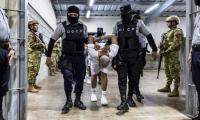PESHAWAR: Speakers at a conference here asked Pakistan and Afghanistan to work together for curbing terrorism that has engulfed the entire region.
They also said dialogue is the only solution and the intellectual input should come through academic activities including seminars, workshops, conferences and people to people contact. They were speaking at a national conference held at the Area Study Centre, (Russia, China & Central Asia), University of Peshawar, to debate “The British (Aitchison) Treaties, Fata and Pak-Afghan Border (Durand Line): Perceptions and Reality.”
The conference attracted academicians, legal and political experts, former bureaucrats, media men, research scholars besides a large number of civil society activists.
The participants discussed at length the perceptions and reality knitted around the geographical dimensions of the issues in the Af- Pak region.
Speaking on the occasion, Shaheed Benazir Bhutto Women University Peshawar Vice-Chancellor Dr Razia Sultana said the dilemma comes when states are not ready to come out of the past legacy. She said the legacy of cold war is still haunting the two neighbouring states, Afghanistan and Pakistan.
The academician said that Fata became a global flashpoint soon after the Taliban government was toppled in the wake of US-led coalition forces attacks in late 2001.
She said this was the appropriate time to come up with political solution to the border management, and especially the Fata region to offer its war-hit citizens decent life opportunities. In his welcome address, Director, Area Study Centre, Dr. Shabir Ahmad Khan, said the basic objectives of the conference was to develop better understanding of the issues and draw a difference between misperceptions and reality in Fata and Pak-Afghan border region.
He believed British treaties in Fata contributed towards fragmented social control that resulted in strong society and a weak state in the Fata.
The delivery of essential services improves state legitimacy, which is the citizen’s belief of the state right to rule over them, he explained.
Dr. Shabir Ahmad Khan suggested that Pak-Afghan border management would be instrumental in checking and curbing external interference in Fata.
He said that dislocations in Fata had dismantled the old forms of social control and the space was there to allow new forms of social control to emerge. Citing the reasons for terrorism in Fata, former chief secretary, and former ambassador to Afghanistan, Rustam Shah Mohmand, said the backwardness and underdevelopment of the Fata region were some of the main causes of the rising tide of militancy there.
He emphasized the early rehabilitation of the displaced persons followed by the mainstreaming of the marginalized tribal belt. The former bureaucrat stressed the need for engagement with the people of Fata. He recommended formation of a commission to pacify the resentment of the people in Fata.
Former University of Peshawar Vice-Chancellor Dr Azmat Hayat Khan talked about some of the myths and misconceptions pertaining to the Pak-Afghan border.
He urged the governments of Pakistan and Afghanistan to join hands for fighting common threat of terrorism through positive engagements to move forward towards a tolerant, integrated and progressive society for the marginalized people of the war-hit areas.
Saad Mohammad, retired brigadier and analyst, emphasized the need for reforms in Fata. He said counter-insurgency effort would not be meaningful and successful unless the political and military authorities on both sides are engaged in settlement of issues.
Dr. Ashraf Ali said the passage of the bill on the extension of higher judiciary to the tribal areas had opened up the door for many more reforms to come down the road.
Senior journalist Rahimullah Yusufzai said some 2,386 development projects were in progress in Fata. He explained that Pakistan has fenced 209-kilometres border in selected areas in Fata apart from building posts and forts along the Pakistani border, he added. However, he pointed out that time and resources were needed on securing the 2,500 kilometer long and porous border.







